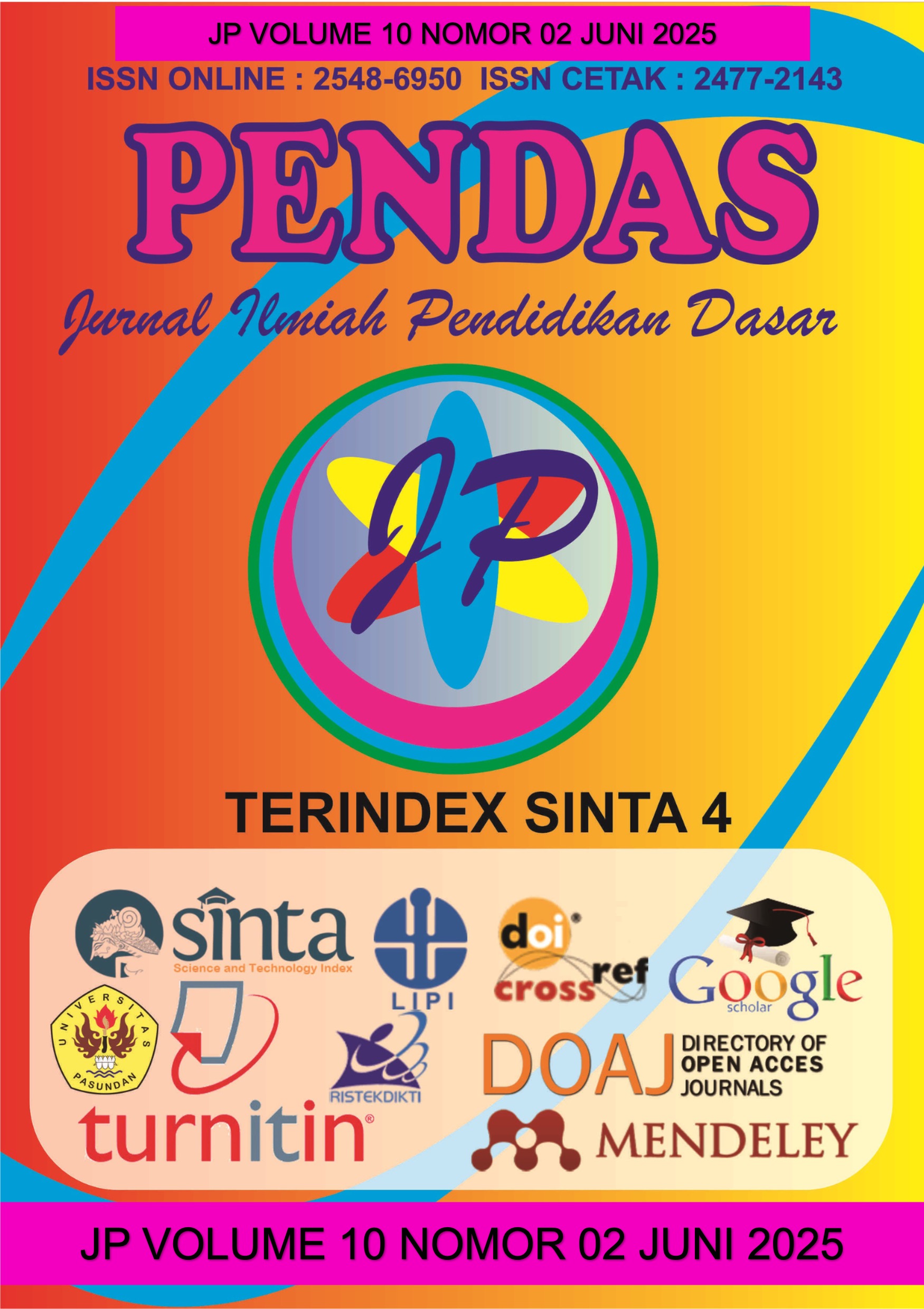INOVASI MODEL PEMBELAJARAN MATEMATIKA ABAD 21: SEBUAH TINJAUAN LITERATUR
DOI:
https://doi.org/10.23969/jp.v10i02.26910Keywords:
learning innovation, 21st century mathematics, mathematical literacy, learning models, literature reviewAbstract
The 21st century brings new challenges and demands in education, especially in mathematics learning. Mathematical literacy now includes not only numeracy skills, but also critical thinking skills, problem solving, collaboration, and technological literacy. This article aims to examine various innovative learning models that have been applied in the context of 21st century mathematics education. Through a literature review of a number of national and international studies, it was found that approaches such as Problem Based Learning (PBL), Project Based Learning (PjBL), STEM education, Blended Learning, and the use of digital technology have a positive impact on improving students' learning outcomes and 21st century skills. This study recommends the development of an adaptive curriculum and ongoing teacher training so that these innovations can be implemented effectively.
Downloads
References
Anitasari, S., Hadi, F. R., & others. (2023). Peningkatan Hasil Belajar Menggunakan Model PBL Berbantuan Media Konkret Matematika Kelas IV SDN 1 Sukorejo. Pendas: Jurnal Ilmiah Pendidikan Dasar, 8(2), 2218–2235. https://doi.org/https://doi.org/10.23969/jp.v8i2.9642
Aprilita, T. D., & Handican, R. (2023). Persepsi Siswa Terhadap Implementasi Model Problem Based Learning pada Mata Pelajaran Matematika. Griya Journal of Mathematics Education and Application, 3(3), 546–560. https://doi.org/https://doi.org/10.29303/griya.v3i3.353
Arifin, B., & Mu’id, A. (2024). Pengembangan Kurikulum Berbasis Keterampilan Dalam Menghadapi Tuntutan Kompetensi Abad 21. DAARUS TSAQOFAH, Jurnal Pendidikan Pascasarjana Universitas Qomaruddin, 1(2), 118–128.
Barus, A. M., Sari, W. W., Stephanie, L., & Rahayu, I. P. (2022). Panduan dan Praktik Baik Project-Based Learning: Menginspirasi, Mencipta, dan Mendedikasikan Karya. PT Kanisius.
Bulkini, J., & Nurachadijat, K. (2023). Potensi Model PJBL (Project-Based Learning) dalam Meningkatkan Motivasi Belajar Siswa di SMP Azzainiyyah Nagrog Sukabumi. Jurnal Inovasi, Evaluasi Dan Pengembangan Pembelajaran (JIEPP), 3(1), 16–21. https://doi.org/https://doi.org/10.54371/jiepp.v3i1.241
Hikmah, M., & others. (2020). Penerapan Model Project Based Learning untuk Meningkatkan Partisipasi dan Hasil Belajar Pemrograman Dasar Siswa. Jurnal Teknodik, 27–38. https://doi.org/https://doi.org/10.32550/teknodik.v0i2.376
Huang, M. C.-L., Chou, C.-Y., Wu, Y.-T., Shih, J.-L., Yeh, C. Y. C., Lao, A. C. C., Fong, H., Lin, Y.-F., & Chan, T.-W. (2020). Interest-Driven Video Creation for Learning Mathematics. Journal of Computers in Education, 7, 395–433. https://doi.org/https://doi.org/10.1007/s40692-020-00161-w
Izzati, A. A., Hanifah, U. S., Anggraeni, S., Azizah, N., & Rohmah, D. F. N. (2021). Pengaruh Blended Learning Dalam Meningkatkan Efektifitas Pembelajaran. Jurnal Eduscience, 8(2), 14–22. https://doi.org/https://doi.org/10.36987/jes.v8i2.2243
Kelley, T. R., & Knowles, J. G. (2016). A Conceptual Framework for Integrated STEM Education. International Journal of STEM Education, 3, 1–11. https://doi.org/10.1186/s40594-016-0046-z
Lin, Y.-W., Tseng, C.-L., & Chiang, P.-J. (2016). The effect of blended learning in mathematics course. Eurasia Journal of Mathematics, Science and Technology Education, 13(3), 741–770. https://doi.org/https://doi.org/10.12973/eurasia.2017.00641a
Muhammad, R., & Faridah, A. (2019). Pembelajaran Reflektif: Seni Berpikir Kritis, Analitis, dan Kreatif. Badan Penerbit Universitas Negeri Makassar.
Nagarajan, S., & Overton, T. (2019). Promoting Systems Thinking Using Project And Problem Based Learning. Journal of Chemical Education, 96(12), 2901–2909.
Novitasari, D., Trisnowali, A., Hamdani, D., Junaidi, J., & Arifin, S. (2021). Pengembangan LKPD berbasis GeoGebra untuk meningkatkan pemahaman konsep matematika. Jurnal Edukasi Dan Sains Matematika (JES-MAT), 7(1), 1–16. https://doi.org/https://doi.org/10.25134/jes-mat.v7i1.3916
Prifti, R. (2022). Self--efficacy and student satisfaction in the context of blended learning courses. Open Learning: The Journal of Open, Distance and e-Learning, 37(2), 111–125. https://doi.org/https://doi.org/10.1080/02680513.2020.1755642
Rafi, M., JianMing, Z., & Ahmad, K. (2019). Technology Integration for Students’ Information and Digital Literacy Education in Academic Libraries. Information Discovery and Delivery, 47(4), 203–217. https://doi.org/https://doi.org/10.1108/IDD-07-2019-0049
Rahmadia, N., Nuranisa, N., surya Maulana, R., & Maharani, I. (2024). Penggunaan Geogebra dalam Trigonometri. OMEGA: Jurnal Keilmuan Pendidikan Matematika, 3(1), 44–50. https://doi.org/https://doi.org/10.47662/jkpm.v3i1.667
Selvianiresa, D., & Prabawanto, S. (2017). Contextual Teaching and Learning Approach of Mathematics in Primary Schools. Journal of Physics: Conference Series, 895(1), 12171. https://doi.org/10.1088/1742-6596/895/1/012171
Wahyuni, A. S. (2022). Literature review: Pendekatan Berdiferensiasi dalam Pembelajaran IPA. Jurnal Pendidikan Mipa, 12(2), 118–126.
Wells, J. G. (2019). STEM Education: The Potential of Technology Education. Council on Technology and Engineering Teacher Education.
Yayuk, E. (2019). Pembelajaran Matematika Sekolah Dasar (Vol. 1). UMMPress.
Downloads
Published
Issue
Section
License
Copyright (c) 2025 Pendas : Jurnal Ilmiah Pendidikan Dasar

This work is licensed under a Creative Commons Attribution 4.0 International License.














































